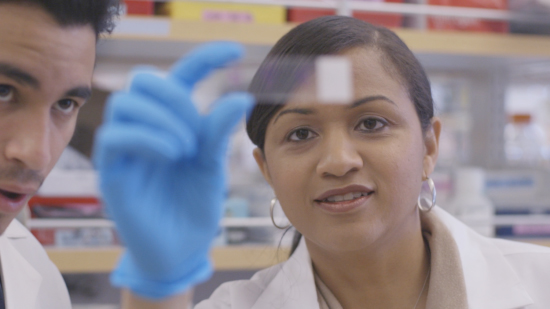
Part of Children’s Hospital Los Angeles’ “We Went First” feature for 2017 Women’s Day
Credit a school field trip with inspiring Senta Georgia to change the world.
When Georgia was a young woman growing up in New Jersey, her fifth-grade class took a field trip to a local chemical company, and students got a chance to meet real-life engineers and see what they did all day. Her tour guide was an African-American chemical engineer.
“That day was the first time I ever saw a scientist who looked like me,” she remembers. “He was a real person. Until then the only black scientist I’d ever heard of was George Washington Carver. I always wanted to be a scientist and study interesting things, but had no idea how to get there. In that moment, all of a sudden it started to be real for me that I could be a scientist, too.”
Georgia went on to earn a bachelor’s degree in biological sciences from Stanford University, and a doctorate in molecular biology from the University of California, Los Angeles. From there, she came to Children’s Hospital Los Angeles, where she has spent the last four years.
Today she serves as principal investigator in the Center for Endocrinology, Diabetes and Metabolism and is a member of the Developmental Biology and Regenerative Medicine Program of The Saban Research Institute of Children’s Hospital Los Angeles, and assistant professor of Pediatrics and Stem Cell Biology and Regenerative Medicine at the Keck School of Medicine of the University of Southern California.
We’re no longer hidden figures in this field; we’re your neighbors, your aunts, your cousins.”
Day in and day out, she works to find a cure for diabetes.
Georgia has spent her entire research career studying insulin cells and diabetes. Her first job out of college was at CHLA as a research technician for an investigator who was studying pancreatic development with the goal of developing new treatments for diabetes. At the time this resonated with her, since her grandmother had just been diagnosed with the disease. After working on the project for a few months, she was hooked.
Since then, Georgia has pursued her own research, with a specific emphasis on the regeneration of insulin-producing pancreatic beta cells to help patients with type 1 diabetes. While immunologists focus on how to block the autoimmune aspect of type 1 diabetes that attacks the body’s naturally occurring beta cells, her efforts focus on how to get more beta cells into a diabetic’s body overall.
Her research on how cells replicate and how changes to DNA are critical to stem cells differentiating into pancreatic beta cells has been featured on the cover multiple journals. And that’s only the beginning.
“I’m trying to understand how we can make new cells,” she explains. “Can we do that in a lab? Can we do it in a clinic and transplant them? If we fix the autoimmune dysfunction of type I diabetes, can we get patients’ bodies to make new insulin cells on their own? For me, it’s not about treatment because that’s palliative. It’s about finding a cure.”
For Georgia, being a woman—an African-American woman—is a huge part of her identity as a scientist. She says that while Bill Nye the Science Guy is a great public advocate for science, he does not represent the whole discipline. To demonstrate, she hearkens back to that fifth-grade field trip, the first time she realized that someone like her could be a scientist. She also reveres the female scientists over the years who mentored her to follow her dreams, did great work, and still went home to be wives and mothers and girlfriends.
“We’re no longer hidden figures in this field; we’re your neighbors, your aunts, your cousins,” says Dr. Georgia. “We’re real people who like to do real-people things. Don’t get caught up in the caricature that science isn’t cool, or that it’s only for one type of person. It underpins every advancement we make as a society, and it’s for everyone. Without it—without all sorts of different people doing it—I doubt we’d grow at all.”
